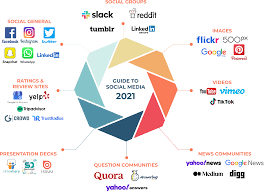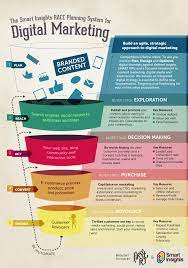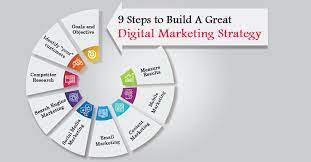The Power of Social Media Marketing
Social media has revolutionised the way businesses connect with their audience. With billions of users worldwide, platforms like Facebook, Instagram, Twitter, and LinkedIn offer unparalleled opportunities for brands to engage with customers and promote their products or services.
Social media marketing is more than just posting updates or sharing content. It involves strategic planning, targeted messaging, and consistent interaction to build brand awareness, drive website traffic, and generate leads.
Benefits of Social Media Marketing
- Increased Brand Visibility: By maintaining an active presence on social media, businesses can reach a wider audience and increase brand recognition.
- Engagement with Customers: Social media provides a platform for direct communication with customers, allowing businesses to address queries, receive feedback, and foster relationships.
- Lead Generation: Through targeted advertising and compelling content, social media can help businesses attract potential customers and convert them into leads.
- Drive Website Traffic: Sharing links to your website on social media can drive traffic and improve your site’s SEO ranking.
- Data Analysis: Social media platforms offer valuable insights into audience demographics, preferences, and behaviours that can inform future marketing strategies.
Tips for Effective Social Media Marketing
- Define Your Goals: Clearly outline your objectives for social media marketing, whether it’s increasing sales, building brand loyalty, or driving website traffic.
- Know Your Audience: Understand the demographics and interests of your target audience to tailor your content effectively.
- Create Engaging Content: Develop high-quality content that resonates with your audience and encourages interaction.
- Maintain Consistency: Post regularly and engage with followers consistently to keep your brand top-of-mind.
- Analyse Results: Monitor metrics such as engagement rates, click-through rates, and conversions to evaluate the success of your social media campaigns.
In conclusion, social media marketing offers businesses a powerful tool to connect with customers, boost brand visibility, and drive business growth. By implementing effective strategies and engaging content, businesses can leverage the full potential of social media to achieve their marketing goals.
Essential FAQs on Social Media Marketing: Strategies, Platforms, and Future Trends
- What is social media marketing and why is it important?
- Which social media platforms are best for marketing?
- How can businesses use social media to promote their products or services?
- What are the benefits of using paid advertising on social media?
- How can businesses measure the effectiveness of their social media marketing campaigns?
- What are some common mistakes to avoid in social media marketing?
- How often should businesses post on social media for optimal engagement?
- What trends are shaping the future of social media marketing?
What is social media marketing and why is it important?
Social media marketing is a strategic approach that utilises social media platforms to promote products or services, engage with customers, and build brand awareness. It involves creating and sharing content tailored to target audiences, running targeted advertising campaigns, and interacting with followers to achieve marketing objectives. Social media marketing is important for businesses as it offers a cost-effective way to reach a large audience, build relationships with customers, drive website traffic, generate leads, and ultimately increase sales. By leveraging the power of social media, businesses can enhance their online presence, connect with their target market on a personal level, and stay competitive in today’s digital landscape.
Which social media platforms are best for marketing?
When considering which social media platforms are best for marketing, it is essential to assess the unique characteristics and target audience of each platform. Facebook, with its vast user base and diverse demographics, is a popular choice for businesses looking to reach a wide audience. Instagram, known for its visual appeal and engagement opportunities, is ideal for brands focusing on visual content and storytelling. LinkedIn caters to a professional audience, making it suitable for B2B marketing and networking. Twitter’s real-time nature is beneficial for timely updates and customer engagement. Ultimately, the best platforms for marketing depend on the specific goals, target audience, and content strategy of each business.
How can businesses use social media to promote their products or services?
Businesses can utilise social media as a powerful platform to promote their products or services by implementing strategic marketing tactics. Firstly, businesses should identify their target audience and choose the most relevant social media platforms where their audience is active. By creating engaging and visually appealing content, such as product images, videos, or informative posts, businesses can capture the attention of users and generate interest in their offerings. Leveraging paid advertising options on social media platforms allows businesses to reach a wider audience and drive traffic to their website or online store. Additionally, actively engaging with followers through responding to comments, messages, and conducting polls or contests can foster customer loyalty and increase brand awareness. Overall, by crafting a cohesive social media marketing strategy that focuses on delivering value to customers while showcasing products or services effectively, businesses can effectively leverage social media to promote their offerings and drive sales.
What are the benefits of using paid advertising on social media?
Utilising paid advertising on social media offers a multitude of benefits for businesses looking to enhance their online presence and reach a targeted audience effectively. Paid advertising allows brands to amplify their visibility and reach beyond organic posts, ensuring that their content is seen by a larger segment of their target demographic. By leveraging paid ads, businesses can drive website traffic, generate leads, increase brand awareness, and ultimately boost conversions. Additionally, the robust targeting options available through social media platforms enable businesses to tailor their ads to specific demographics, interests, and behaviours, maximising the return on investment and achieving measurable results.
How can businesses measure the effectiveness of their social media marketing campaigns?
Businesses can measure the effectiveness of their social media marketing campaigns through various metrics and analytics tools. Key performance indicators (KPIs) such as engagement rates, reach, click-through rates, conversion rates, and return on investment (ROI) provide valuable insights into the impact of social media efforts. By tracking these metrics over time, businesses can assess the success of their campaigns, identify areas for improvement, and make data-driven decisions to optimise their social media strategy. Additionally, conducting A/B testing, monitoring audience feedback, and using social media analytics platforms can help businesses evaluate the performance of their campaigns and ensure they are meeting their marketing objectives.
What are some common mistakes to avoid in social media marketing?
When it comes to social media marketing, avoiding common mistakes is crucial for achieving success. Some frequent pitfalls to steer clear of include inconsistent posting schedules, neglecting audience engagement, overly promotional content that lacks authenticity, ignoring analytics and failing to adjust strategies accordingly, and not tailoring content to suit each platform’s unique features and audience preferences. By being mindful of these errors and adopting a strategic approach that prioritises quality, relevance, and audience interaction, businesses can maximise the impact of their social media marketing efforts and build stronger connections with their target audience.
How often should businesses post on social media for optimal engagement?
Finding the right balance in social media posting frequency is crucial for optimal engagement. While there is no one-size-fits-all answer, businesses should aim to maintain a consistent posting schedule that aligns with their audience’s preferences and platform algorithms. Posting too frequently can overwhelm followers, leading to disengagement, while posting too infrequently may cause your brand to be forgotten. It’s essential to monitor engagement metrics and adjust your posting frequency accordingly to strike the right balance and keep your audience engaged and interested in your content.
What trends are shaping the future of social media marketing?
The future of social media marketing is being shaped by several key trends that are transforming the way businesses engage with their audience online. From the rise of video content and live streaming to the increasing importance of influencer collaborations and personalised messaging, these trends are driving innovation and pushing boundaries in the digital marketing landscape. As social media platforms continue to evolve and user behaviours shift, businesses must adapt their strategies to stay relevant and effectively reach their target audience in a dynamic and competitive online environment.







